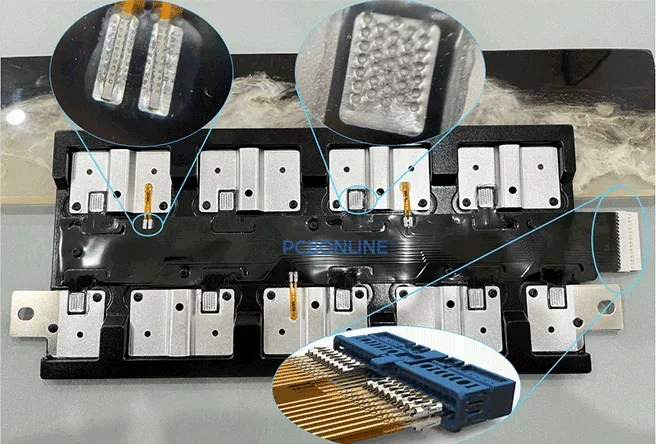
Flexible printed circuit boards, also known as FPCs or flexible PCBs, can bend and are double-sided and multilayer, allowing them to connect circuits and solder components in compact spaces.
Similar in appearance but much simpler in construction, FFC (flexible flat cable) and FDC (flexible die-cutting circuit) also provide flexibility and electrical connections for two ends in tight spaces.
How do FPC, FFC, and FDC connect with the other flexible or rigid circuit boards and hardware structural parts of the system?
Flexible PCB connectors come in various types to connect FPC, FFC, and FDC with the other parts.
Overview of Flexible PCB Connectors
The commonly used FPC connectors are ZIF and LIF connectors. Additionally, there are FFC connectors and IDC (Insulation Displacement) connectors. When choosing connectors for flexible PCBs/FFC/FDC, you must consider Pins, Pitch, locking mechanism, and Vertical or Horizontal orientation.
The connector's pin count and pitch must match the FPC/FFC/FDC exactly.
ZIF Connector for FPC, FFC, and FDC
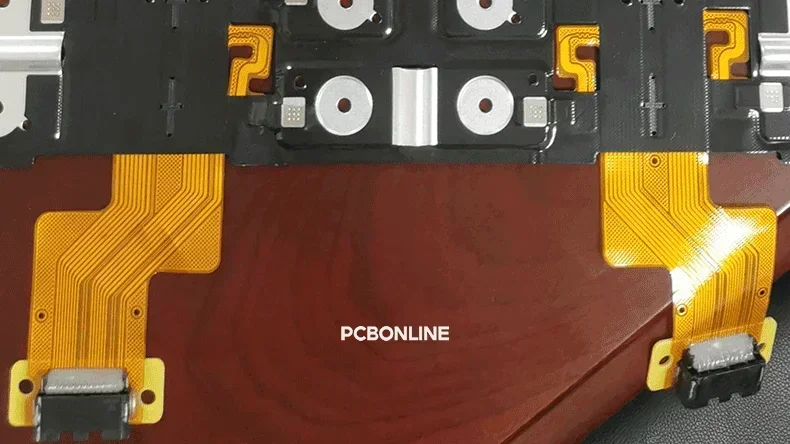
ZIF means Zero Insertion Force. ZIF connectors allow the FPC, FFC, and FDC to be inserted and secured by a lock without applying force. They usually have 4 to 60 pins, and pitches of 1.0mm, 0.5mm, or 0.3mm.
- Features: Require minimal force to insert or remove, often with flip-lock or slider-lock mechanisms.
- Application: Widely used to connect FPCs and FDCs to mainboards in smartphones, laptops, digital devices, wearables, automotive electronics, industrial controls, and medical equipment.
- Advantage: High reliability, less damage to FPC terminals.
- Installation method: vertical/horizontal, top/bottom connection, front lock/back lock
- Lock structure: Flip-top lock type is recommended for frequent plugging and unplugging
LIF Connector for FPC and FFC
LIF means Low Insertion Force. An LIF connector is a plug-in connector without a lock. It is not suitable for frequent plugging and unplugging, and is easy to loosen.
Compared with ZIF, an LIF connector is cheaper and simpler in structure, but its reliability is worse.
- Features: Slightly higher insertion force than ZIF, simpler structure.
- Advantage: Cost-effective, suitable for less demanding environments.
FFC connector for flat cables
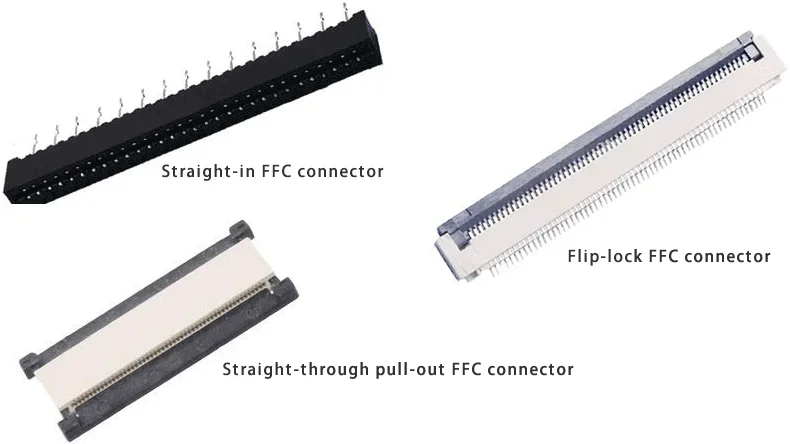
FFCs are flat ribbon cables whose structure is much simpler than FPCs. They can't solder components as FPCs do, but only electrically connect the two ends for insertion into the ZIF connector. Their connectors are ZIF connectors or specialized FFC connectors.
The FFC connectors include:
- Straight-in FFC connector, without any lock
- Flip-lock FFC connector locks the flat ribbon cables in the flip cover by lifting up and down
- Straight-through pull-out FFC connector, inserts FFC into the pull-out locks on both sides, and locks
IDC Connector for FDC
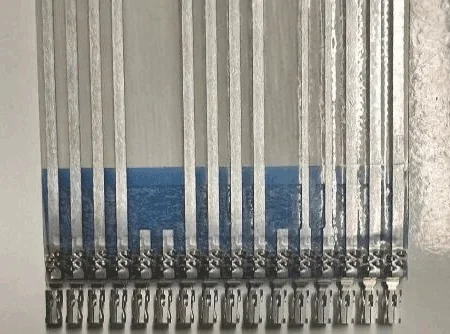
IDC means insulation displacement, which pierces through the insulation of an FDC and makes direct contact with the conductor inside. ZIF and IDC connectors can both be used for FDC connection.
The IDC connector consists of cables with sharp metal blades and a slotted plastic housing. The metal blades inside the connector cut through the insulation layer of the FDC and make contact with its conductive core.
IDC connectors are specialized for a flexible die-cutting cell connection system for battery packs. IDC connection saves space and costs.
Flexible PCB Connectors Application Case -- Cell Connection System
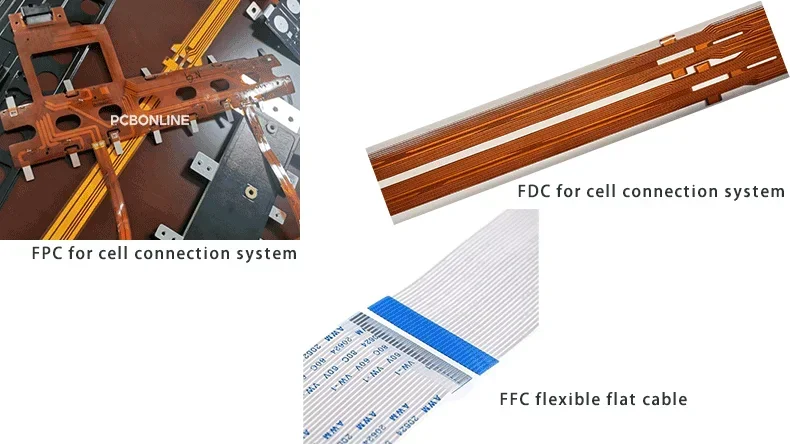
In a battery pack, the cell connection system is a flexible PCBA customized according to the cell arrangement and enclosure. Its base can be wiring cables, an FPC, or an FDC. The cell connection system connects the battery cells and the BMS, collects cell voltages and temperatures, and acts as the fast and slow charging pathways.
Every cell connection system has at least one connector, and the total current of the CCS is concentrated in the path where the connector is located. The connector depends on the cell connection system's base.
If the cell connection system uses a flexible PCB, the connector that connects the FPC CCS to the battery management system is a ZIF connector.
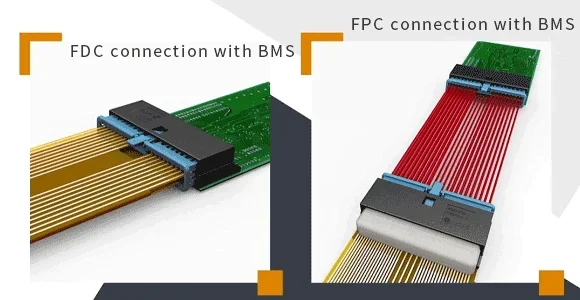
If the cell connection system uses a flexible die-cutting circuit, which reduces fabrication costs compared to the FPC, the connector is an IDC connector.
If the cell connection system uses very bulky wiring cables, it uses multiple ZIF connectors. The connection method is one connector for each cable or one connector for a few cables.
Below, you can find two cell connection systems manufactured by the custom PCBA manufacturer PCBONLINE.
Flexible PCB CCS
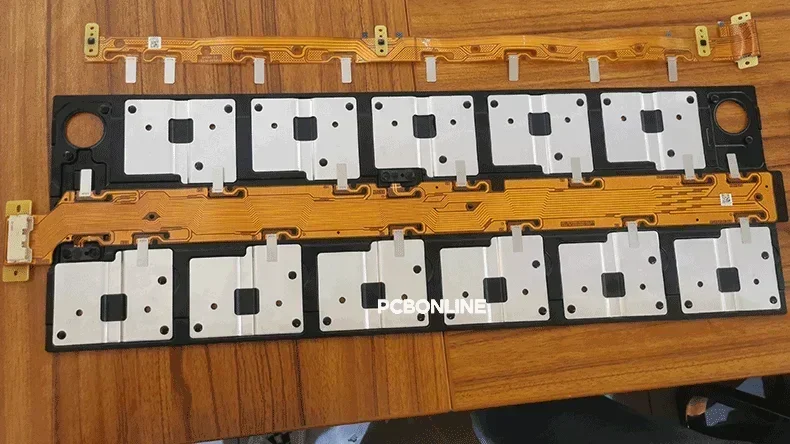
FDC CCS
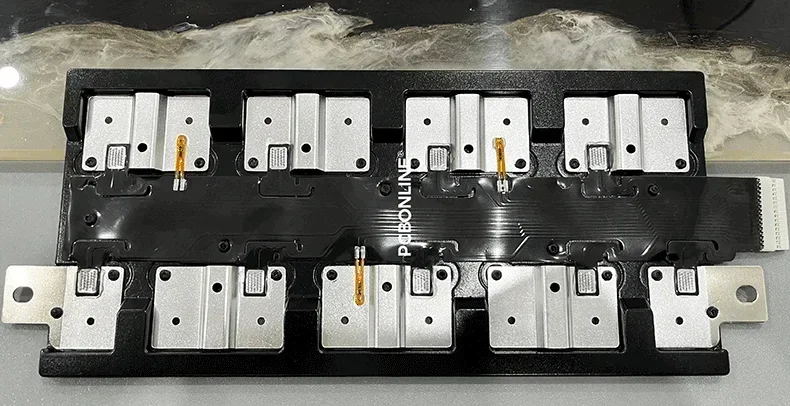
Note: FFCs are not reliable enough and are not used for a cell connection system.
Partner with PCBONLINE for Flexible PCB and CCS Manufacturing
The FPC and CCS manufacturer PCBONLINE doesn't specifically provide flexible PCB connectors. However, PCBONLINE provides flexible PCB manufacturing and assembly, component sourcing, and custom cell contact system manufacturing from prototypes to mass production.
No matter what CCS solutions you are looking for, FDC, FPC, PCB, or wiring cables, you can work with the CCS and BMS Manufacturer PCBONLINE for R&D and one-stop manufacturing.
The R&D for the cell connection system is a systematic work. It involves the appearance and dimension design of the battery pack and layout of the cell modules, so the R&D team from PCBONLINE needs to work with your mechanical engineers for the CCS solution design. PCBONLINE only charges $1,000-$2,000 for the R&D of your CCS, BMS, or battery pack project.
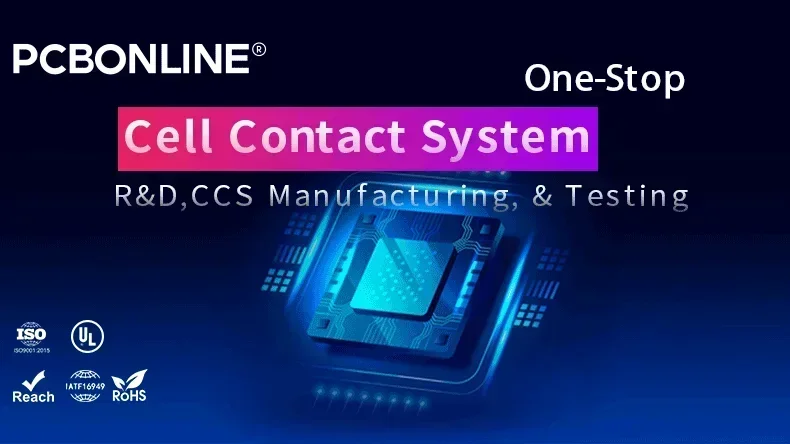
If you want to buy the custom-made aluminum/copper busbars, nickel sheets, wiring cables, NTCs, and flexible PCB connectors for your CCS or battery pack project, PCBONLINE can also supply them to you.
Founded in 1999, PCBONLINE has two advanced PCB manufacturing bases, one turnkey PCB assembly factory, stable material and component supply chains, and long-term cooperation with the top 3 mold and enclosure manufacturers in China for jigs/fixtures, molds, and enclosures. Below you can check the FDC CCS capabilities of PCBONLINE.
|
FDC capabilities
|
Processing parameters
|
|
Equipment widths
|
250mm
|
|
Processable aluminum thickness
|
0.018mm-0.1mm
|
|
Maximum rotary die diameter
|
400mm
|
|
Minimum line width/spacing
|
0.3mm
|
|
Fuse width
|
Die cutting 0.12mm, laser 0.1mm
|
|
Minimum solder mask opening of the coverlay
|
0.6mm (round hole, square hole)
|
|
Line width processing accuracy
|
±0.03mm
|
|
Cutting seam processing accuracy
|
±0.1mm
|
|
Fitting alignment accuracy
|
±0.2mm
|
|
Outline hole to line processing accuracy
|
±0.2mm
|
|
Minimum spacing from outline edge to board edge
|
2mm
|
|
Thermal lamination roller temperature control
|
Temperature uniformity ±5℃
|
|
FDC appearance
|
Lines are neat and smooth, no jumping edges, no gaps, no copper chips
|
|
Coverlay appearance
|
No bubbles or wrinkles
|
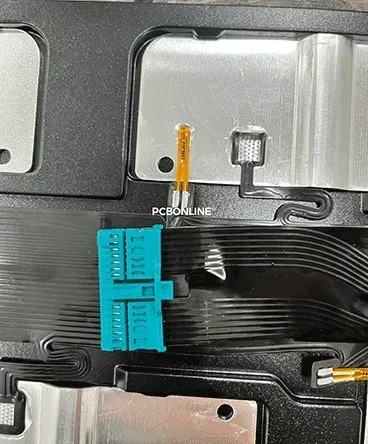
Besides, PCBONLINE fabricates and assembles FPCs and FDCs, and procures flexible PCB connectors and FFCs.
Design: appearance and structural design for the battery pack, PCB/FPC layout of the CCS, BMS design, and verification.
Manufacturing: independent PCB/FPC manufacturing for the CCS, CCS assembly, including ultrasonic welding and laser welding
Components supply: connectors, copper busbars, aluminum busbars, blister and injection molding brackets, standard BMS, current-carrying SMT copper strips, wiring cables
PCBONLINE can provide any connectors for FPC, FFC, and FDC for PCB assembly without a quantity limit.
The FPC, CCS, and custom BMS from PCBONLINE are certified with ISO 9001:2015, ISO 14001:2015, ISO 16949:2016, RoHS, REACH, UL, and IPC-A-610 Class 3.
As a source factory for FPC, CCS, and BMS, PCBONLINE can provide complete certifications. Whether the FPC, CCS, or BMS is industrial or commercial grade, we can match your target price. Bulk orders support installment payments.
Support quality traceability, and the default period for PCBONLINE's custom BMS and CCS for battery packs is 5 years.
PCBONLINE offers free prototyping/sampling and PCBA functional testing for FPC assembly/CCS/BMS massive production, and can solve all issues to ensure smooth processes and successful results.
If you need FFCs and connectors, PCBONLINE can source them according to your requirements as well.
PCBONLINE has successfully manufactured and assembled many FPCs, FDCs, cell connection systems, and battery management systems, and has rich R&D and manufacturing experience. To get a quote for FPCs, FDCs, CCS, BMS, or flexible PCB connectors, please send your inquiry by email to info@pcbonline.com.
Conclusion
FPC, FFC, and FDC provide bendable electrical connections in tight spaces. What's more, FPC, which has complex constructions, can solder components and be multilayered. The reliable connectors for FPC, FFC, and FDC are ZIF. FFC connectors are specially for FFC, and IDC connectors are for FDC. No matter what flexible connection solution you plan for your project, you can partner with the one-stop flexible manufacturer PCBONLINE, especially for the cell connection system for battery packs.
Battery Management System Manufacturing at PCBONLINE.pdf
CCS Product Introduction - PCBONLINE.pdf








